Ducks and geese belong to a bird family called Anatidae, or waterfowl, which also includes swans. This is why ducks and geese are usually mistaken as they may look similar appearance-wise, and they’re also found in the same habitats.
Geese aren’t ducks. Both birds are biological relatives under the same family but are essentially not in the same genus. Geese can strongly resemble ducks, which is why the confusion in categorizing both species is a common occurrence, even in the scientific community.
Learn more about geese and ducks and their physical attributes, diets, distinctive characteristics, what makes both of them similar and different, and answers to interesting questions about these birds by reading more of this article!
Duck Identification
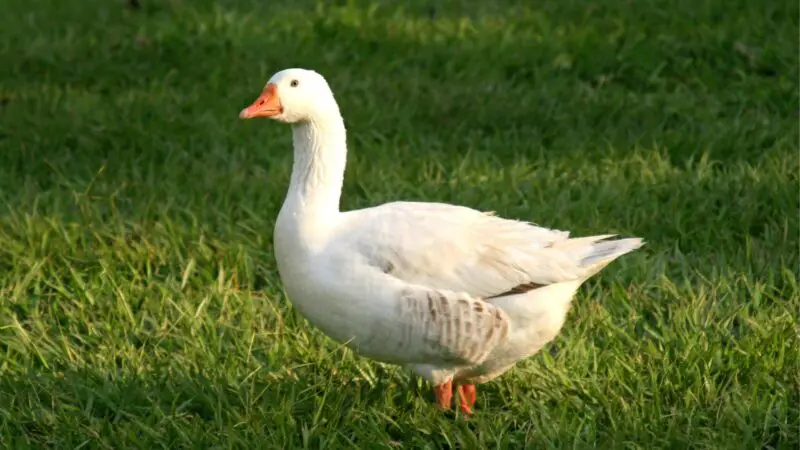
Ducks are excellent swimmers due to their nature as semi-aquatic birds that inhabit places with dense or substantial amounts of vegetation, such as forests and woodlands, near both freshwater and saltwater water sources such as ponds, rivers, streams, and marshes. They’re friendly and generally docile towards other ducks, animals, and humans.
- Appearance: Depending on the species, ducks can have red facial skins, claws on their legs, and compact, horizontal, or vertical-shaped bodies. Their plumage can range from varying shades or a combination of white, gray, black, brown, blue, and green with varying patterns such as pure coloration, barred, piped, and pied.
- Lifespan: 2 to 23 years (captivity), 5 to 27 years (captivity)
- Height: 30 to 67 centimeters
- Weight: 450 grams to 1.8 kilograms
- Neck Length: 8 to 17 centimeters
- Wingspan: 14 to 98 centimeters
- Bill Size: 4 to 6 centimeters
- Egg Size: 61 to 79 millimeters (length), 45 to 55 millimeters (width)
- Food Preferences: Fruits, green plants, rice, nuts, grain, small fish, snails, insects, frogs, worms, mollusks, and crustaceans
- Place Of Origin: Eurasia, North America, North Africa
- Characteristics: Highly social birds that often live in pairs or with their ducklings. Diurnal but also semi-nocturnal, especially during bright nights or full moons. Some species are migratory and can fly long distances, such as the Muscovy duck, but some are sedentary and aren’t able to fly like the Peking duck.
Goose Identification
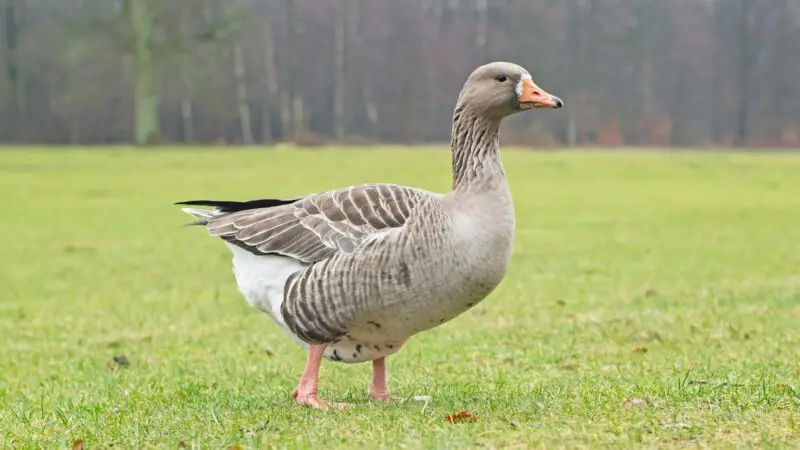
Geese prefer to inhabit grassy areas near rivers, ponds, coastlines, or marshes but are also often seen in urban and suburban communities that have grassy lawns and agricultural lands. They can be aggressive during mating season but are otherwise friendly to other geese, animals, and humans.
- Appearance: Large bodies with long and slender necks, flattened and humped beaks, and scaly feet and claws. Their plumage can be varying shades of black, white, gray, and brown with varying patterns such as banded, patches, barred, or streaked.
- Lifespan: 10 to 30 years (wild), Up to 30 years (captivity)
- Height: 55 to 110 centimeters
- Weight: 1.1 to 6.5 kilograms
- Neck Length: Up to 40 centimeters
- Wingspan: 106 centimeters to 1.8 meters
- Bill Size: 3 to 7 centimeters
- Egg Size: 66 to 77 millimeters (length) and 48 to 55 millimeters (width)
- Food Preferences: Primarily leaves, algae, grass, berries, seeds, and roots but occasionally feed on insects, aquatic invertebrates, small fish, mollusks, and crustaceans.
- Place Of Origin: Canada, United States of America, Eastern Asia
- Characteristics: Migratory birds, except for the resident Canada geese, are highly social and typically live in small flocks. Species like the Egyptian geese are sedentary but move to a different body of water depending on their environmental conditions. All geese are vocal, especially during migration.
What Are the Differences Between Geese and Ducks?
- Physical attributes. Geese have larger and longer body proportions, noticeably their neck length, wingspan, weight, and height, compared to ducks, which have compact and shorter bodies. Ducks have more colorful plumage, while geese are limited to varying shades of white, black, gray, and brown.
- Communication. Although both birds are vocal, ducks make a distinct quacking sound when communicating with other individuals or when feeling threatened while geese produce honking sounds.
- Breeding. While it is only a subtle difference, geese are usually monogamous for life unless their partner dies, in which they will find another suitable mate. Ducks, on the other hand, are seasonally monogamous. This means that the mating bonds they form with each other only last a season instead of a long-term bond.
- Diet. Geese are generally considered herbivores as they primarily eat and survive on plants and vegetation. However, they can feed on insects, fish, and crustaceans when necessary, technically making them omnivores. Meanwhile, ducks are omnivores as they eat both plants and aquatic invertebrates.
- Egg clutch size. Geese usually lay fewer eggs than ducks. Depending on the species, ducks will lay about 4 to 16 eggs per season, while geese produce about 2 to 10 eggs.
What Are the Similarities Between Geese and Ducks?
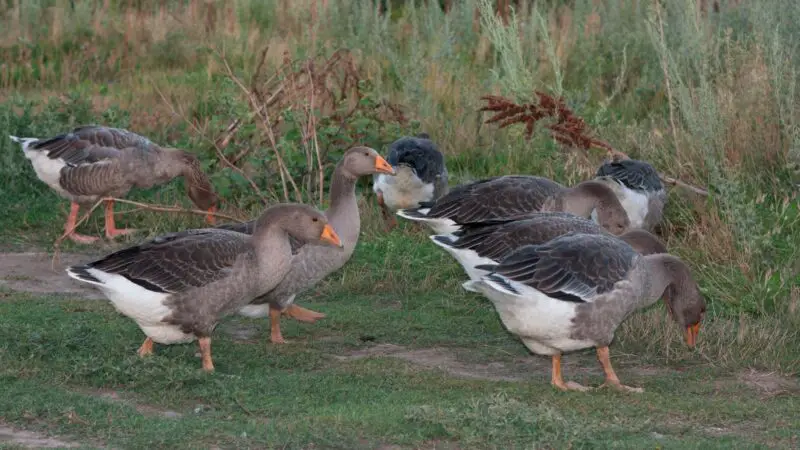
Behavior. Both birds are migratory, with certain exceptions depending on species, and are highly social animals that naturally thrive in small flocks. They’re also excellent swimmers as they belong to the waterfowl family and live near bodies of water. When interacting with other ducks, animals, and humans, they’re generally docile and friendly.
Are Geese and Ducks Related?
Both geese and ducks belong to the family Anatidae, commonly referred to as waterfowl, along with swans. They’re all characterized by having relatively larger bodies, compared to other birds and webbed feet made for swimming and floating.
Do Ducks and Geese Get Along?
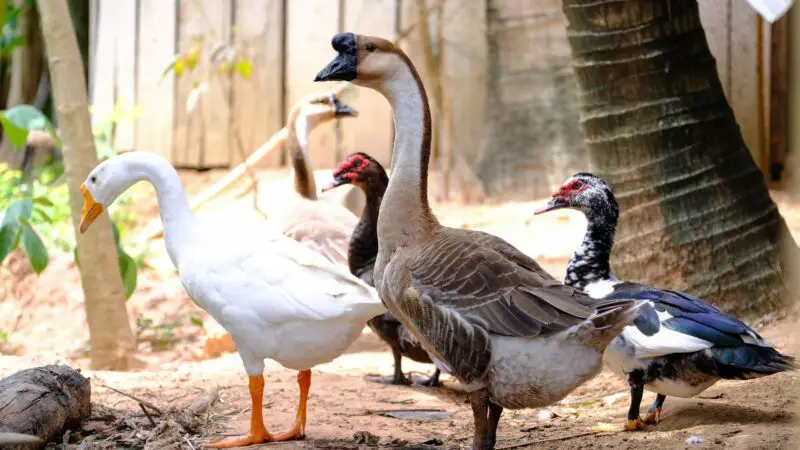
Ducks and geese are friendly with one another, but owners have to make sure they cater to each bird’s individual needs, such as food, nesting, and sleeping areas, and provide enough space for both birds to wander freely.
What to Feed Wild Ducks and Geese?
You can feed wild ducks and geese cereal crops (e.g. rice and millet), oats, seeds, chopped lettuce, and birdseed since they can provide the birds with energy and some nutrients and minerals.
However, avoid feeding them all the time as the food you give them will accumulate and become bulky matter inside the birds’ stomachs, therefore causing potential nutritional deficiencies or gastrointestinal diseases.
Wild ducks and geese usually feed on grains, aquatic plants and invertebrates, and grasses that are naturally found in the wild. They often eat them in combination so that they get all the essential nutrients they need to survive.
Cereal crops, corn, oats, and crackers are considered “junk food” to them and can be unhealthy when consumed in large amounts. It is also considered illegal in some states to feed waterfowl, such as California.
Can Ducks and Geese Mate?
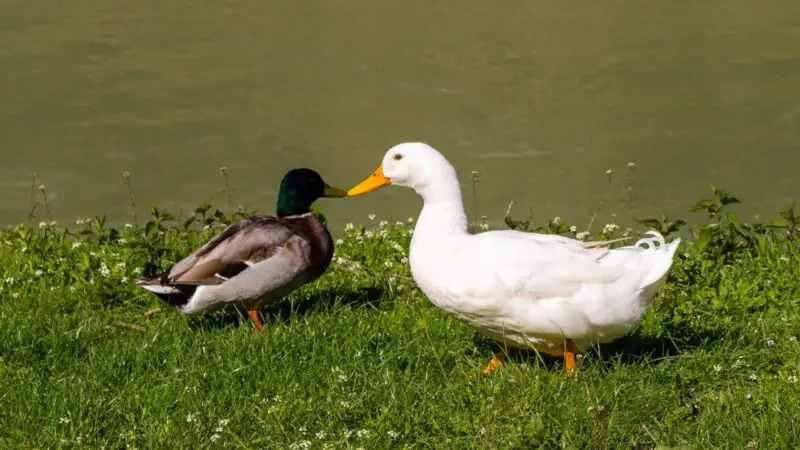
Ducks and geese cannot mate. The two birds may live together and can even attempt to reproduce, but they can never create a fertilized egg or a crossbreed species.
Are Geese as Messy as Ducks?
Geese are messy as ducks. Geese leave a lot of their droppings in residential neighborhoods, regardless if they’re wild or domesticated. The fecal matter can be found in parking lots, lawns, patios, and virtually any outdoor item that they can reach.
Do Ducks and Geese Make Good Pets?
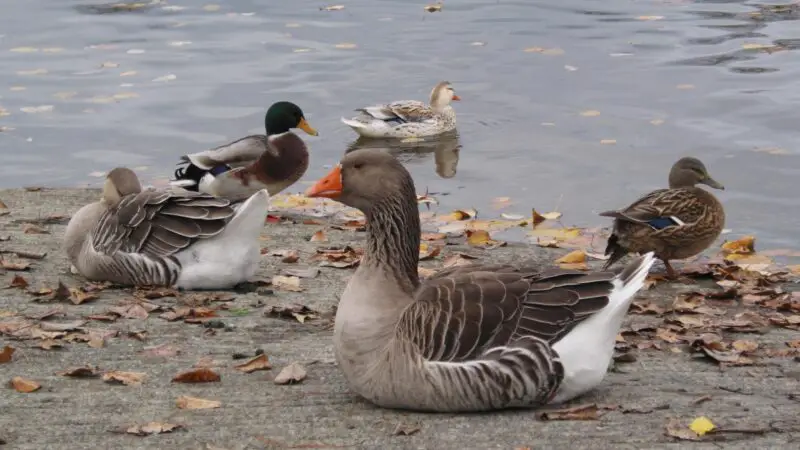
Both birds can be domesticated and be kept as pets since they have a docile and friendly nature.
Make sure you provide them with adequate housing conditions, such as ensuring they have a substantial space to move around. Indoor night housing requires at least 1 square meter per bird, while outdoor housing requires 2 square meters per bird.
They also need a swimming area and a grassy yard as it is essential for their survival. You also have to adopt them in pairs or groups of 3 individuals or more since they like to live in flocks. This will also help create a more healthy and natural environment for your pet geese and ducks.
Geese and ducks are two completely different birds that are categorized under the same family, Anatidae or commonly referred to as waterfowl. They’re both semi-aquatic animals that live near bodies of water and are natural swimmers.
Geese are relatively larger, make honking sounds, are usually monogamous, and lay 2 to 10 eggs, while ducks are more compact, making quacking sounds, are seasonally monogamous, and lay 4 to 16 eggs.
List of Sources
Behavioural Characteristics of Domestic Ducks
